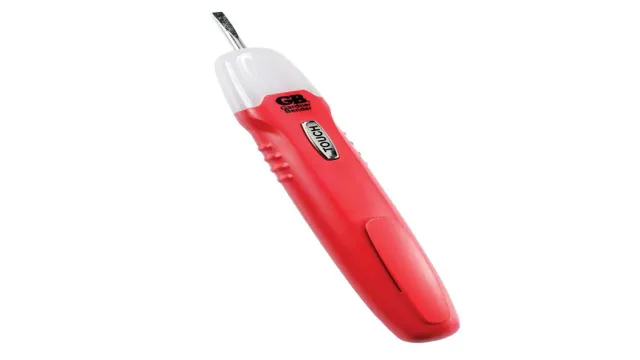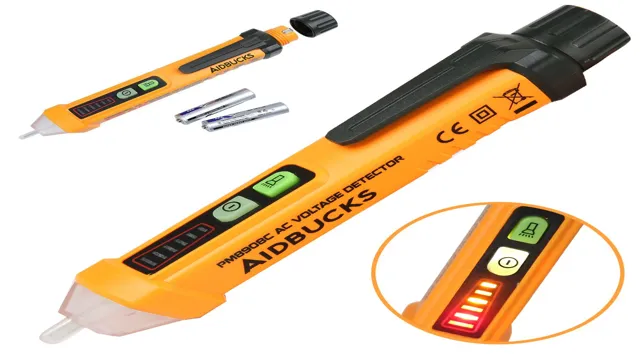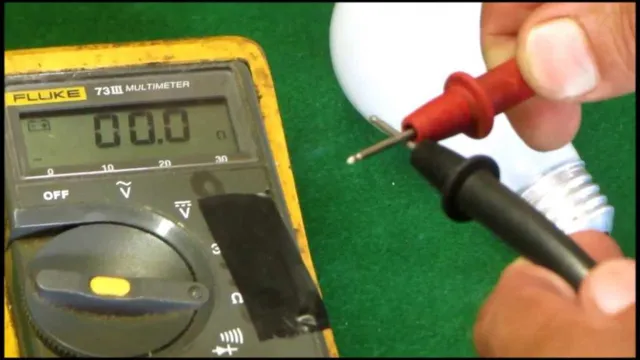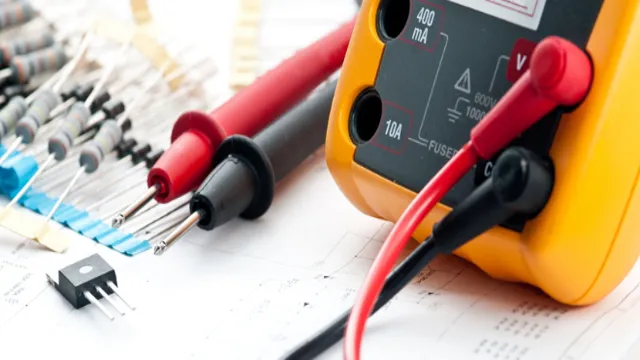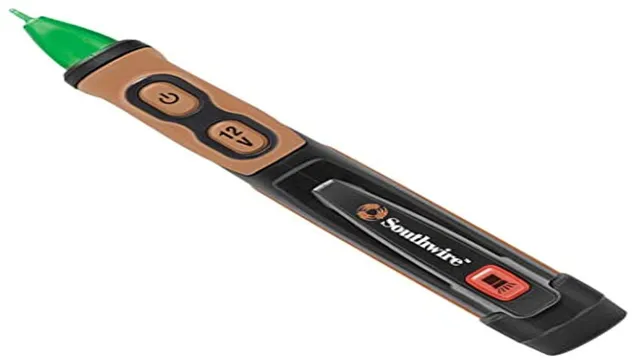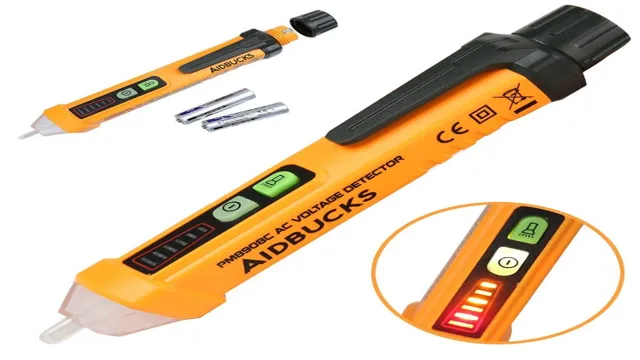How Much Does a Voltage Tester Cost? A Comprehensive Guide to Pricing and Features
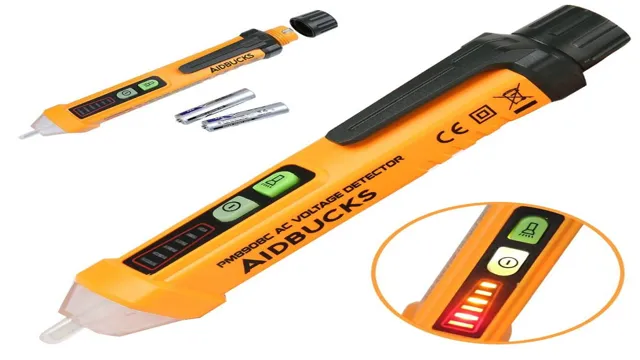
If you’re working with electrical devices or equipment, a voltage tester is a must-have tool for safety reasons. But you may be wondering, how much should you expect to spend on a voltage tester? The answer, of course, depends on various factors, but generally, voltage testers range from as low as $5 to as high as $300. Why such a vast price range? Well, it all comes down to features and quality.
Basic voltage testers with fewer features are cheaper than advanced ones with multiple functions. A budget voltage tester is suitable for occasional use and simple tasks, but if you’re a professional electrician or often deal with complex systems, a high-end voltage tester will be your best bet. But don’t let the price deter you from investing in a high-quality voltage tester.
Your safety is paramount, and a poorly made voltage tester can put you at risk. Think of it as an insurance policy to protect yourself and those around you from electrical hazards. In this blog, we’ll discuss the different types of voltage testers and their costs, as well as what features to consider and what factors determine the price.
So, whether you’re a beginner or an experienced electrician, keep reading to find out how much you should expect to spend on a voltage tester.
What is a voltage tester?
If you’re working with electronics, a voltage tester is a must-have tool in your toolkit. It can help you determine whether a wire or circuit is current-carrying, which can be essential for safety. When considering how much a voltage tester costs, it’s important to know that there’s a wide range of prices available.
Basic models can be found for less than $10, while more advanced models with features like LCD screens and audible alarms can cost upwards of $100. It’s important to note, however, that price doesn’t necessarily equate to quality. It’s possible to find reliable, accurate voltage testers at lower price points if you don’t need all the bells and whistles of the higher-end models.
Ultimately, you should consider your specific needs and budget when choosing a voltage tester.
– Definition
A voltage tester is a device that is used to determine whether an electrical circuit is live or not. It works by measuring the voltage between two points in the circuit and indicating whether or not there is electricity flowing through it. This is an essential tool for anyone who works with electrical systems, from professional electricians to DIY enthusiasts.
Using a voltage tester is a simple process that involves turning off power to the circuit, touching the probes of the tester to the wires, and observing the reading on the device. It is important to use a voltage tester before working on any electrical system to ensure safety and prevent accidents. By detecting the presence of electrical current, a voltage tester can help to prevent electrocution, fires, and other hazards.
Using a voltage tester is a simple and effective way to stay safe when working with electricity.

– Types of voltage testers
A voltage tester is an essential tool for electricians to quickly determine if a circuit or electrical appliance is “hot” or not. It measures the voltage level of an electrical wire or outlet, ensuring that it is safe to work on. There are different types of voltage testers available, including non-contact testers, circuit testers, and multimeters.
A non-contact tester is the most common type, as it can easily detect the presence of voltage without making contact with the wire or outlet. Circuit testers are used to identify wiring problems, while multimeters can measure various electrical properties, including current, resistance, and voltage. When selecting a voltage tester, it is important to consider the type of work to be done and the level of precision required.
For instance, a non-contact tester may be sufficient for simple tasks, while a multimeter is necessary for more complex electrical work. Always make sure to use the appropriate voltage tester for the job to ensure safety and accuracy.
Factors that influence the cost
“How much does a voltage tester cost?” is a question that many people ask themselves when it comes to buying a new voltage tester. There are various factors that can influence the cost of a voltage tester, including the brand, type, and features it provides. For example, some voltage testers may come with additional safety features or multiple testing modes that can make them more expensive.
The brand name itself can also play a significant role in pricing, with well-known and reputable brands generally costing more than lesser-known ones. Additionally, the type of voltage tester you choose can influence the cost, with handheld models being more affordable compared to more complex bench-top testers that are used in industrial settings. In general, it’s important to do research and determine your specific needs before making a purchase so you can choose the right voltage tester for your project while staying within your budget.
– Type of voltage tester
The cost of a voltage tester can vary depending on several factors. The type of voltage tester is one of the most significant factors that can influence the cost. Different types of voltage testers have their unique features that affect their prices.
For instance, a non-contact voltage tester that detects electrical fields will cost more compared to a simpler model that doesn’t have this feature. Another factor that can affect the cost of a voltage tester is the brand. Generally, well-known brands tend to be more expensive than lesser-known brands.
The durability of the tester is also an important factor to consider. A voltage tester with a sturdy construction and high-quality materials will cost more than a tester made of cheap materials that are prone to damage. Finally, the accuracy of the tester is also significant, and a highly accurate voltage tester will cost more compared to a less precise model.
Regardless of the type, brand, durability, or accuracy, investing in a good voltage tester is crucial in ensuring safety when working with electrical circuits and equipment.
– Brand and quality
When it comes to purchasing products, one of the main factors that influence the cost is the brand and quality. In most cases, well-known brands with a good reputation tend to charge more for their products. This is because they have invested in creating a brand that is recognizable and trusted by customers.
The quality of the product also plays a significant role in the cost. Higher quality materials and workmanship often come at a higher price. However, it is important to note that not all expensive products are of high quality.
To ensure that you are getting the best value for your money, it is crucial to do your research and examine the quality of the product before making a purchase. Sometimes, lesser-known brands offer the same quality as a well-known brand at a lower cost. It all comes down to understanding which brands offer the quality that you need and which products are worth the investment.
By doing so, you can make informed decisions when shopping and get the best product for your budget.
– Features and functions
When it comes to developing software, there are numerous factors that can influence the cost. Features and functions are among the top factors. The more complex and intricate the software is, the more expensive it will be to develop.
Customizing the software to meet unique business needs and requirements can also push the cost up. Integrating the software with other systems and applications can also add to the cost. Furthermore, the development process and the level of expertise required can also influence the cost.
A team of experienced developers will most likely charge more to build custom software than less experienced developers. Testing and maintenance costs are also additional factors to consider when analyzing the overall cost. Ultimately, the cost of building custom software will depend on the specific requirements and needs of the business.
– Testing range
When it comes to testing range, there are several factors that can influence the cost. One of the main factors is the type of test being performed. For example, some tests require specialized equipment or personnel, which can be more expensive to implement.
Another important factor is the complexity of the test. Tests that require a lot of data or analysis can be more costly to perform because of the time and resources required. Additionally, the range of the test can also impact the cost.
If the test needs to cover a large area, it may require more resources to conduct, leading to higher costs. Other factors that can influence the cost include the number of subjects being tested, the duration of the test, and the level of accuracy required. Overall, it’s important to carefully consider all of these factors when planning a testing range to ensure that the costs are manageable and the test is effective.
Price ranges for voltage testers
When it comes to voltage testers, the price can vary depending on the features and quality of the device. A basic voltage tester can be found for as low as $5, making it an affordable option for those who need a quick and simple way to test electrical current. However, for those who require more advanced features, such as non-contact voltage detection or live wire warning, the price can range anywhere from $20 to $100 or higher.
It’s important to remember that the cost of a voltage tester doesn’t always indicate its accuracy or effectiveness. It’s important to do your research and read reviews before making a purchase to ensure you are getting a quality device that meets your needs and budget. Overall, the cost of a voltage tester can vary greatly, but with a little research, you can find a reliable and affordable option that will give you peace of mind when working with electricity.
– Basic models ($5-$15)
When it comes to voltage testers, there are various price ranges to choose from. Basic models are typically budget-friendly, ranging from $5 to $1 These testers are great for individuals who need a simple tool to test the presence or absence of voltage.
Despite their affordable price, basic models come with some essential features that make them handy to have on hand. These features include an LCD display, a compact design, and a durable construction. Notably, these testers can detect both AC and DC voltage, making them versatile for testing different circuits and outlets in your home.
Additionally, the simplicity of these testers makes them easy to use, even for beginners. Overall, basic models are an excellent option for individuals who need a reliable voltage tester at an affordable price.
– Mid-range models ($15-$50)
When it comes to buying a voltage tester, the price can vary greatly depending on the model and features. Mid-range models typically cost between $15 and $50. These testers are a step up from budget models, providing more accuracy and reliability.
They are suitable for DIY enthusiasts and electricians who need a reliable tool without breaking the bank. However, keep in mind that these testers may not have all the features that professionals require, but they will still display the presence of voltage. Some popular options in this price range include non-contact testers, which can detect voltage without touching the wire, and manual testers, which require direct contact with the wire.
Overall, mid-range voltage testers offer a solid performance and are an excellent choice for most home DIY projects. Plus, they represent good value for money, offering a balance of features and affordability.
– High-end models ($50 and up)
When it comes to voltage testers, prices can vary quite a bit depending on the model and features you’re looking for. If you’re on a tight budget, you can find basic voltage testers for under $ These models are often simple and straightforward, making them a good option for the average homeowner who just needs to check the voltage of an outlet or circuit.
If you want more advanced features, such as the ability to test for continuity or measure resistance, you’ll likely need to spend a bit more. Mid-range voltage testers can cost between $20 and $50, and they may have additional features like audible alerts or backlit displays. For professionals or those who need the most accurate readings, high-end models can cost $50 or more.
These models often come with advanced features like True RMS readings, insulated probes, and advanced safety features. Whether you’re a homeowner or a professional electrician, there’s a voltage tester out there that can meet your needs and budget.
Conclusion
In the world of electrical work, safety should always be the top priority. And one tool that can help you in ensuring safety is the voltage tester. So, the question is, how much are you willing to pay for your safety? A voltage tester can cost you anywhere between $5 to $100, but investing a few extra bucks on a quality tester can potentially save you from costly and dangerous mishaps.
In the end, it’s not about the price tag, but about the peace of mind that comes with knowing that you have a reliable and accurate voltage tester in your toolbox.”
FAQs
What is a voltage tester used for?
A voltage tester is used to determine the presence and amount of voltage in an electrical circuit.
What are the different types of voltage testers?
There are several types of voltage testers, including non-contact testers, contact testers, and circuit testers.
How do non-contact voltage testers work?
Non-contact voltage testers work by detecting the electromagnetic field that surrounds live electrical conductors.
How accurate are contact voltage testers?
Contact voltage testers are very accurate and provide precise readings of voltage levels.
Can voltage testers be used to test DC voltage?
Yes, some voltage testers are designed to test both AC and DC voltage.
How much does a basic voltage tester cost?
Basic voltage testers typically start at around $10, but more advanced models can cost upwards of $100.
What safety precautions should be taken when using a voltage tester?
When using a voltage tester, always wear protective gear, ensure the circuit is de-energized, and follow the manufacturer’s instructions carefully to avoid injury or death.


